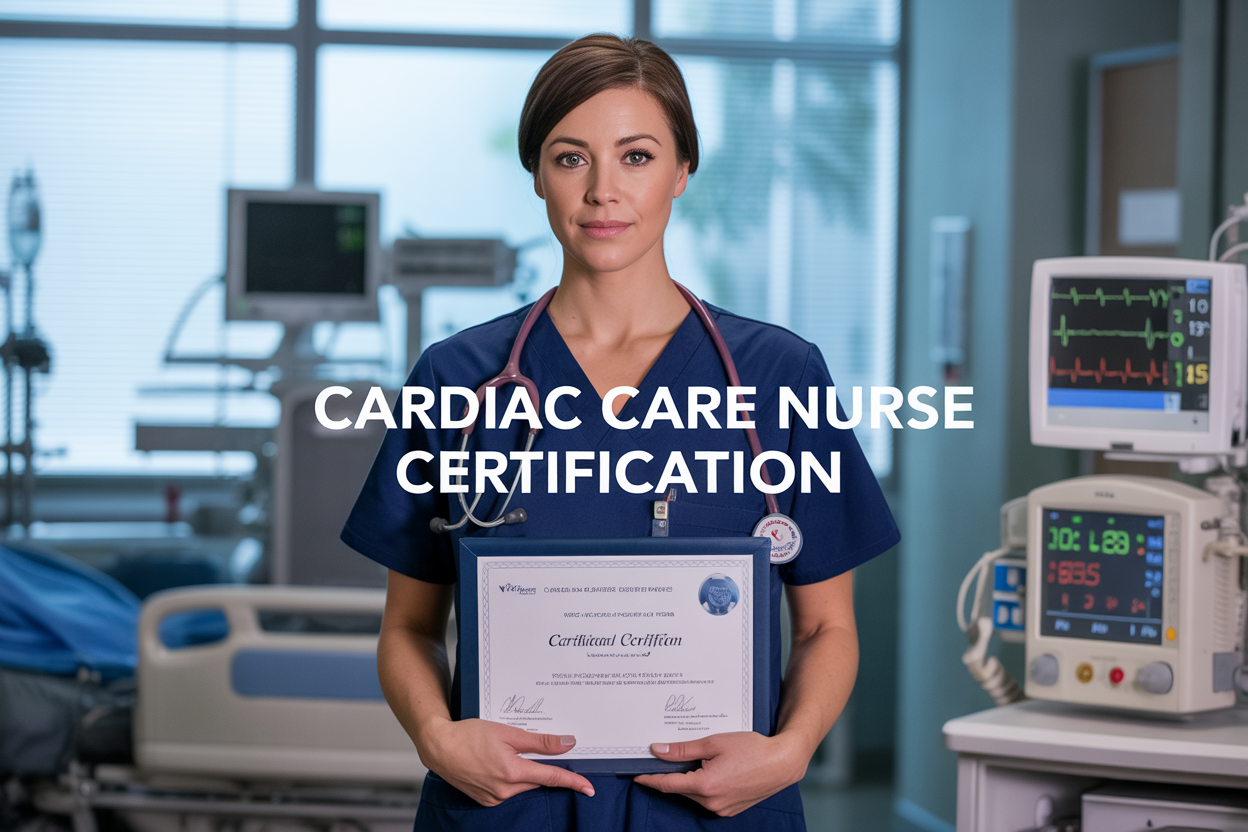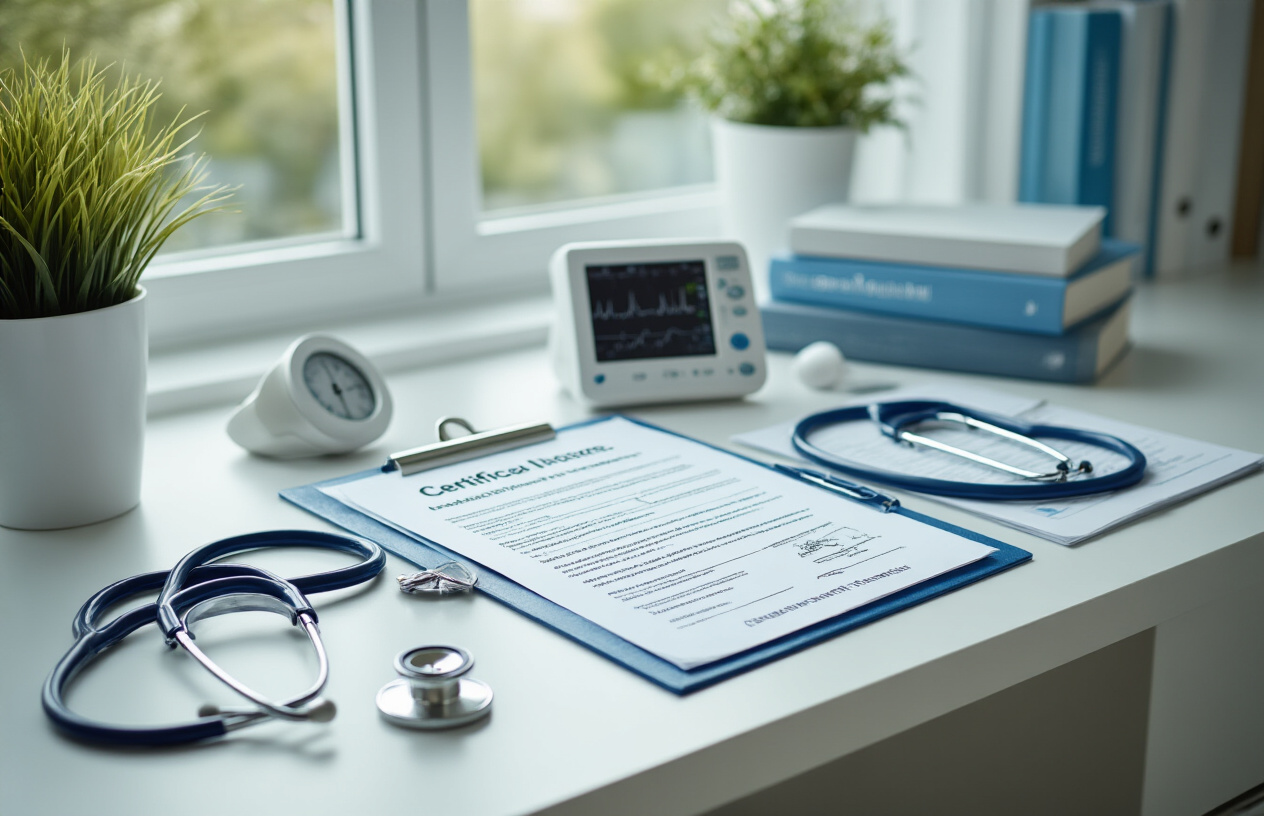
Getting your cardiac care nurse certification can transform your nursing career and open doors to specialized, high-demand roles in cardiology. This certification is perfect for registered nurses who want to excel in cardiac units, intensive care, or cardiovascular specialty practices.
We’ll walk you through the certification requirements and core competencies you’ll develop, from advanced cardiac monitoring to patient education skills. You’ll also discover the career advancement opportunities waiting for certified cardiac care nurses, plus practical strategies for exam preparation and maintaining your credentials long-term.
Understanding Cardiac Care Nurse Certification Requirements

Essential Educational Prerequisites and Nursing Experience Needed
Cardiac care nurse certification demands a current RN license and typically requires 2-4 years of direct cardiovascular nursing experience. Most programs expect candidates to have worked in cardiac units, intensive care, or emergency departments. Bachelor’s degree in nursing is preferred but not always mandatory. Some certifications accept associate degrees with additional clinical hours. Recent graduates can pursue entry-level cardiac certifications after completing specialized cardiovascular training programs.
Accredited Certification Programs and Their Specific Criteria
The American Association of Critical-Care Nurses (AACN) offers the Progressive Care Certified (PCCN) credential, while the Cardiovascular Credentialing International (CCI) provides the Cardiac Medicine Certification (CMC). Each program has distinct requirements: PCCN focuses on progressive care environments, requiring 1,750 hours of experience, while CMC emphasizes cardiac medicine knowledge with 2,000 clinical hours. Both organizations maintain rigorous standards and require continuing education for recertification.
Timeline Expectations for Completing Certification Requirements
The certification journey typically spans 6-12 months from application to exam completion. Candidates need 3-6 months for preparation, including study materials review and practice exams. Application processing takes 4-6 weeks, while exam scheduling adds another 2-4 weeks. Many nurses dedicate 10-15 hours weekly to study preparation. Fast-track options exist for experienced nurses, potentially reducing preparation time to 8-12 weeks with intensive study schedules.
Core Competencies Developed Through Cardiac Care Certification

Advanced Cardiac Monitoring and Interpretation Skills
Cardiac care certification transforms your ability to read complex heart rhythms and spot dangerous changes before they become critical. You’ll master 12-lead ECG interpretation, recognize subtle arrhythmias, and understand hemodynamic monitoring systems. This expertise lets you catch early warning signs that less trained staff might miss, making you an invaluable asset to any cardiac team.
Emergency Cardiac Intervention Techniques and Protocols
When cardiac emergencies strike, your certification training kicks in with life-saving protocols. You’ll learn advanced CPR techniques, defibrillation procedures, and medication administration during cardiac arrest situations. The certification covers everything from managing acute chest pain to coordinating rapid response teams, ensuring you can act decisively when seconds count and patient outcomes hang in the balance.
Patient Education Strategies for Cardiovascular Health
Your certification equips you with proven methods to teach patients about heart-healthy living and medication compliance. You’ll develop skills in creating personalized education plans that stick, using visual aids and simple language to explain complex cardiac conditions. These communication abilities help patients understand their diagnosis, follow treatment plans, and make lifestyle changes that prevent future cardiac events.
Collaborative Care Coordination with Cardiology Teams
Certified cardiac care nurses become the communication hub between patients, families, cardiologists, and other specialists. Your training covers effective handoff procedures, interdisciplinary rounds participation, and care plan coordination. You’ll learn to advocate for patients while working seamlessly with physicians, pharmacists, and therapists to deliver comprehensive cardiac care that addresses every aspect of the patient’s needs.
Career Advancement Opportunities with Cardiac Care Credentials

Specialized nursing roles in cardiac units and catheterization labs
Cardiac care certification opens doors to highly specialized positions within cardiovascular departments. Certified nurses can advance into catheterization lab roles, working directly with interventional cardiologists during complex procedures like angioplasties and stent placements. These positions require advanced technical skills and offer exposure to cutting-edge cardiac technologies. Certified nurses also qualify for specialized ICU roles, electrophysiology units, and cardiac rehabilitation programs, where they work with patients recovering from heart surgeries and managing chronic cardiac conditions.
Leadership positions in cardiovascular departments
Certification creates pathways to management and leadership roles within cardiac departments. Many hospitals prefer certified nurses for charge nurse positions, clinical educator roles, and nurse manager positions overseeing cardiac units. These leadership opportunities involve mentoring new staff, developing protocols, and ensuring quality patient care standards. Certified nurses often become go-to resources for complex cardiac cases and may advance to clinical nurse specialist or nurse practitioner roles with additional education.
Increased salary potential and compensation benefits
Cardiac care certification significantly boosts earning potential across all experience levels. Certified nurses typically earn 10-15% higher salaries than their non-certified counterparts, with specialized roles commanding even greater premiums. Many healthcare systems offer certification bonuses ranging from $1,000 to $5,000 annually, plus tuition reimbursement for continuing education. The specialized nature of cardiac care makes certified nurses valuable assets, leading to better shift differentials, overtime opportunities, and comprehensive benefits packages including professional development funding.
Preparing Successfully for Cardiac Care Certification Exams

Recommended study materials and preparation resources
Start with the American Association of Critical-Care Nurses (AACN) official study guide and practice questions, which directly align with exam content. Supplement with cardiac nursing textbooks like “AACN Core Curriculum for High Acuity, Progressive, and Critical Care Nursing” and online platforms offering interactive modules. Join study groups through professional organizations and use flashcard apps for ECG interpretation and medication dosages. Many hospitals offer review courses specifically designed for cardiac certification exams.
Practice exam strategies and time management techniques
Break your study sessions into focused 90-minute blocks with 15-minute breaks to maximize retention. Take multiple practice exams under timed conditions to build stamina and identify weak areas. Read questions carefully, eliminating obviously wrong answers first, then choose the best response based on current evidence-based practices. Create a study calendar starting 12 weeks before your exam date, dedicating extra time to challenging topics like hemodynamics and cardiac pharmacology.
Clinical experience requirements and documentation tips
Most cardiac certifications require 1,750-2,000 hours of direct cardiac care experience within the past two years. Keep detailed logs of your clinical hours, including specific units worked and types of patients cared for. Document complex cases you’ve managed, procedures you’ve assisted with, and continuing education hours completed. Save performance evaluations and letters of recommendation from supervisors who can verify your cardiac nursing experience and competency levels.
Networking with certified cardiac care professionals
Connect with certified colleagues through social media platforms like LinkedIn and specialized nursing forums. Attend cardiac nursing conferences and local chapter meetings where you can meet mentors willing to share study tips and career advice. Many certified nurses offer informal mentoring relationships that provide ongoing support during your preparation journey. Consider joining professional organizations early to access member-only resources and build relationships that extend beyond certification preparation.
Maintaining and Leveraging Your Cardiac Care Certification

Continuing Education Requirements and Professional Development
Cardiac care certifications require ongoing education to maintain credibility and stay current with rapidly evolving cardiology practices. Most certifying bodies mandate 30-40 continuing education units every two to three years, covering areas like advanced cardiac life support, pharmacology updates, and emerging technologies. Attending cardiac conferences, completing online modules, and participating in simulation training helps nurses meet these requirements while expanding their clinical expertise and networking opportunities.
Building Expertise Through Specialized Cardiac Subspecialties
Cardiac nurses can deepen their expertise by pursuing subspecialty certifications in areas like electrophysiology, heart failure management, or cardiovascular surgery. These specialized credentials open doors to highly focused roles such as device clinic coordinator, heart transplant specialist, or cardiac catheterization lab technician. Each subspecialty requires dedicated study time and clinical experience, but the investment pays off through increased job security, higher salaries, and recognition as a subject matter expert within cardiac care teams.
Career Transition Strategies Into Advanced Cardiac Care Roles
Moving into leadership positions requires strategic planning beyond clinical competency. Successful transitions often involve pursuing advanced degrees like MSN or DNP programs while gaining experience in quality improvement projects and staff mentoring. Building relationships with cardiac administrators, volunteering for committee work, and developing expertise in areas like cardiac rehabilitation or preventive cardiology creates pathways to roles such as cardiac unit manager, clinical nurse specialist, or cardiovascular program coordinator.
Cardiac Care Nurse Certification: Strengthen Your Expertise in Heart Care
Heart diseases are on the rise, and skilled Cardiac Care Nurses are in high demand across hospitals and ICUs. If you want to specialize in advanced heart care and stand out in your nursing career, the Cardiac Care Nurse Certification from Global A1 Institute of Paramedical Science is the perfect choice.
This online recorded course is designed to help nurses learn ECG interpretation, cardiac monitoring, emergency cardiac care, and more — all from the comfort of home.
Why Choose Global A1 Institute of Paramedical Science?
✅ Learn directly from experienced cardiology experts and doctors
✅ Fully online recorded sessions with lifetime access
✅ Join our active doubt-solving community
✅ Affordable fee with easy monthly EMI options
✅ ISO-certified and career-enhancing certification
Take the next step toward becoming a skilled and confident cardiac care nurse.
👉 Enroll today with Global A1 Institute of Paramedical Science and advance your nursing career with confidence!
Getting your cardiac care nurse certification opens doors you might not have imagined. The specialized knowledge you’ll gain about heart conditions, advanced monitoring techniques, and critical care protocols makes you an invaluable team member in any cardiology setting. Your expertise in managing complex cardiac patients will set you apart from general nurses and position you for leadership roles, higher salaries, and opportunities in specialized cardiac units.
The investment in your certification pays off both professionally and personally. You’ll find yourself working with cutting-edge technology, collaborating with top cardiologists, and making a real difference in patients’ lives during their most vulnerable moments. Start preparing now by reviewing the certification requirements and creating a study plan that works for your schedule. Your future patients and your career will thank you for taking this important step toward becoming a cardiac care specialist.
Author
-

Dr. Sunil Saini is a distinguished orthopedic surgeon with expertise in cosmetic limb lengthening, deformity correction, and Ilizarov surgery. With a career spanning over two decades, he has made significant contributions to the field of orthopedics, particularly in advanced limb lengthening techniques.
View all posts

